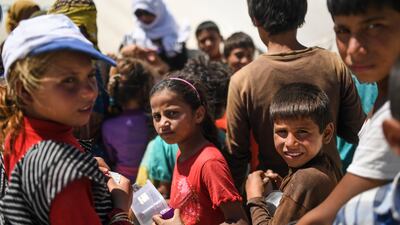The United Nations said on Wednesday it was using newly opened land routes in Syria to expand food deliveries to areas around the northern city of Raqqa, where US-backed forces are battling ISIL militants.
The new access has allowed the World Food Programme to deliver food to rural areas north of the city for the first time in three years.
More than 190,000 people have been displaced from and within Raqqa province since April 1, according to the UN refugee agency. In the past 48 hours, hundreds of civilians managed to flee areas under ISIL control and cross to territory seized by the US-backed alliance known as the Syrian Democratic Forces, according to the Syrian Observatory for Human Rights, a Britain-based monitoring group.
As the map of which group controls what changes, so too has the access and WFP said it is now delivering food every month to nearly 200,000 people in eight hard-to-reach locations inside Raqqa province as well as other areas in a neighbouring province.
Prior to the re-opening of the road linking Aleppo in the west to Hassakeh in the east, the WFP relied on airlifts.
"Replacing airlifts with road deliveries will save an estimated US$19 million (Dh69.8m) per year, as each truck on the road carries the equivalent of a planeload of food at a significantly lower cost," said Jakob Kern, the WFP country representative in Syria.
"With these cost savings and improved access, we are now reaching more families and people returning to their homes who need our help with regular food deliveries."
One area that is now reachable is the strategic town of Tabqa, which was taken from ISIL by the Syrian Democratic Forces in May. This month, WFP said it was able to double the number of people it reaches, delivering monthly food rations to 25,000 people, many of whom have returned to their original homes and are now working to rebuild their lives.
The advance towards the city of Raqqa began last year.
The fight against ISIL is only one facet of the war in Syria, which is now in its seventh year. Six rounds of UN-brokered peace talks in Geneva have failed to bring the warring sides closer to a political settlement.
A seventh round is now underway in the Swiss city, but expectations for a breakthrough are almost non-existent.
On Wednesday, the head of the Syrian opposition delegation accused president Bashar Al Assad's government of refusing to engage in political discussions.
Nasr Al Hariri of the High Negotiations Committee also challenged the UN security council to "uphold its responsibilities" and maintain pressure on Mr Al Assad to honour resolutions that the council has passed. He spoke to reporters after emerging from talks with the UN envoy for Syria, Staffan de Mistura, in the latest round of indirect peace talks.
Mr Al Hariri cited the "continuous refusing" of Mr Al Assad's government to participate in political negotiations.
Security council resolution 2254 from December 2015 called on top UN officials to convene the two sides "to engage in formal negotiations on a political transition process".
Also on Wednesday, a human rights group said Syrian-Russian air strikes and artillery attacks on a town in southern Syria last month killed 10 civilians in and near a school.
Human Rights Watch said one of the air strikes hit the courtyard of a middle school in the town of Tafas in the southern province of Deraa, killing eight people, including a child. It said most of those killed were members of a family who had been displaced from another town.
Two other civilians, including a child, were killed an hour earlier by artillery attacks near the school, the group said.
Bill Van Esveld, the senior children's rights researcher at the US-based group, said on Wednesday that "as long as no one is held responsible for such repeated unlawful attacks, it's likely they will continue".

